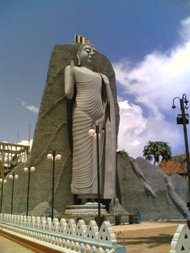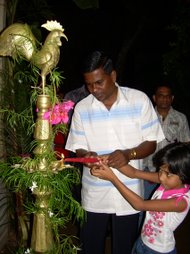A banquet served on banana leaves
Banana leaves figured very prominently whenever banquets were held by the King of Kandy to visiting Dutch Ambassadors who called on him now and again. Why banana leaves? Well, they used them as plates. In a country where they ran things very very simply there was no need for elaborate chairs and tables and other paraphernalia when there were simpler substitutes.
The lack of these, of course, may have caused some awkwardness for foreigners to sit for either lunch or dinner. But the Dutch did sit, even on the ground, knowing very well not only that one should in Rome do as the Romans do but also if they didn’t the King would view it as a breach of diplomatic etiquette and the punishment would be very, very severe.
Habits
A previous Ambassador, Herr de Joeng, who had slighted the King, may be even unwittingly, was kept waiting for seven months a few distances away from Gannoruwa, denying him an audience until he died in oblivion. What the history book hasn’t told us about is our eating and drinking habits in the past.
Johann Wolfgang Heydt, a German artist who worked for the Dutch East India Company, spreads out his story handsomely with drawings and all. It tells us about his two and a half years stay in Ceylon, the greater part of it being spent in the Maritime Provinces.
| |
To come back to the banquet which Heydt is speaking of, it first began with a presentation of gifts. The King had ordered that all the representatives of the Dutch company down to the slaves be given gifts.
There was a tame elephant for the Ambassador, a Sinhala crafted sabre and a well-worked sheath of solid silver and a baldrick to hang the sabre from, which was done immediately by strapping it across the ambassador’s right shoulder.
Other gifts of Sinhala craftsmanship included two rings of gold set with precious uncut gems, silks and fine linen and delicately carved ivory combs used by women to keep the hair in place.
“I for my part,” remarks Heydt, “received a few piece of linen, a piece of silk, a knife, a stylus [panhinda] neatly inlaid with silver, together with a silver sunang or lime box [killottay]; but the others received somewhat less, down to the slaves, each of whom was gratified at the least with a petticoat, such as they are accustomed to wear.”
With everybody pleased in one way or another they were now looking around to sit for the meal. The Ambassador and his two assistants were seated on a long bench laid with straw mats.
The bench was about a foot high from the ground. Heydt doesn’t tell us exactly where the Ambassador placed the banana leaf he was given or how his two assistants settled down to receive the food, because in the picture he drew there is no table visible.
For one thing, he was seated on the ground far away from the Ambassador and his assistants. And he may not have been watching them either when the Royal servants started serving the food, beginning with the Ambassador, in a hierarchical order down to the slaves.
It was a fairly crowded hall that afternoon as the retinue, nearly a mile or two long, that came with the Ambasador included some company officials, an interpreter, native soldiers employed by the Dutch and slaves and attendants who also had to be accommodated at that meal.
Meanwhile, Heydt not being an expert in the art of sitting in the padma asana style was squatting on the ground with his outstretched feet parallel to the floor. For him the ground, as he said, was both his table and chair.
Thus seated on the ground with the banana leaf handed to him lying beside him, the attendants came along to distribute what he said were baked cakes, which were in a basket. Each guest was given about two or three cakes.
The other dish that was served was also a baked dish but had a Portuguese name Keteri.
Express delight
At the next round the attendants distributed a few other items, which he said included what he called pepper balls, sugar and bananas. The fate of Herr de Joeng was very much in their minds and they had been instructed not to show displeasure at what they were consuming, but to express their delight in the food they ate.
“If we should have laughed much among ourselves,” admits Heydt, “at their fantastic entertaining and showed a poor appetite, we then might suffer vexation.” So, much against their will, they stuffed themselves and some fell ill later as a result.
Something that lifted their hearts at the end of the meal was the sight of a “lovely black drinking vessel, very ornamentally made, (that) was set before the Ambassador” and before each of the five other Dutchmen including Heydt.
But to their disappointment the vessel contained, alas, not wine as the Dutchmen expected, but only water. Yet for all that they were intrigued by the coolness of the water this beautiful vessel contained.
They were told that the vessel was made from a special type of clay obtainable only in the Kandyan kingdom and as a result these drinking vessels were in great demand in the Maritime Provinces. So, says Heydt “We, therefore, took these vessels away with us.”
When the ambassadorial party finally got back to Colombo they had been away for three months. On their outward journey, which passed through Hanwella and Sitawaka they had halted for a few days at these forts. They had started out from Colombo on November 9, 1736 and reached Kandy, on December 31.
The most precious object they were taking with them were the letters to the King from the Dutch Company which were borne by members of the Appuhamy and Appo rank; the Appuhamys were strictly responsible for carrying the letters on a specially made silver tray placed on the head while the four Appos were appointed to hold a canopy over it and all of them relieving each other as the journey proceeded.
Unburdened as they were on the return journey they did the march in a record time of seven days, a distance of 72 miles!
Sinhala law
Heydt is not as entertaining a writer as Robert Knox. In a way, however, he supplements Knox by telling us what took place in the Maritime Provinces, which were under the Dutch. The Dutch took the precaution of not interfering with the Sinhala law that prevailed throughout the island when they came.
But occasionally they seem to have departed from it. Under the King only the males were whipped for offences. In the Maritime Provinces both parties, men and women, were whipped for certain offences.
Commenting on the Sinhala law with regard to marriage and divorce, Heydt says, “They make therefore little ado in their divorces, but the wife takes with her the dowry that she brought, perhaps a few head of cattle, some money, clothes and now and then, if she is of higher rank, some slaves.”
Heydt pays a compliment to the Sinhala woman - “And in truth they have in this, much better learning than the Dutch women, to know how they must act right lovingly with their men.”
And a compliment to men, which should be highly treasured today in this age of scandal and corruption: “One notices also...a great obstinacy in them when one offers them money...nothing is had from them for money, since they think that for money only Coulys carry, or do other work.”
And also, “There are no lawyers among them as with us, but their disputes are argued among themselves and settled at once, which also is better than our long suits.”
And how things have changed from those days before the values from the West distorted our style of living. Heydt who comes from a land of schnapps and wine would have been greatly surprised by what he saw: “The most excellent thing about them is, that they have a loathing of drunkenness, and one sees among them very few who give themselves to it, except the most degraded of them. And in general they are very temperate, and it is not hard to consort with them; and when one has been taught a little of their customs, one can get on well with them.”
Heydt’s Ceylon has been translated from the German into English by Major Raven Hart who was for a time in the Fifties domiciled in Ceylon. He was an adventurer who undertook difficult exploits like rowing up the Mahaweli Ganga or down the Mississippi or up the Irrawadi.
Arthur Clarke has called him ‘a most unforgettable character.’ Apart from his canoeing he had an interest in antiquarian books and in philosophies that may have led him to take an interest in Heydt’s German original. ‘Heydt’s Ceylon’ was published by the Government Information Department in 1952.






















































No comments:
Post a Comment